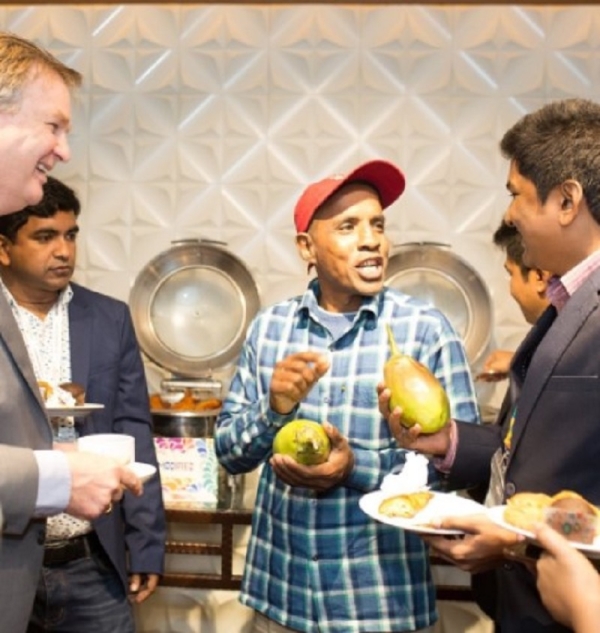
Photo: Farmer Milon Mia discusses the benefits of growing genetically modified Bt brinjal.
In a bid to expand awareness about the role of agricultural innovations in achieving food security, Farming Future Bangladesh (FFB) hosted a recent training program for scientists and others at the Four Points Sheraton Hotel in Dhaka.
The program, titled “‘Agribiotechnology for Food Security: Communicating Science, Evidence and Policy,” focused on the skills of effectively communicating both the science behind agricultural innovations and the societal benefits associated with its public acceptance and adoption.
“If we are serious about ending hunger and poverty, we must transform global agriculture,” said Md. Arif Hossain, CEO & executive director of FFB. “Agricultural biotechnology is an important tool in this transformation. We offered this training workshop to help our research scientists and other leaders in the agricultural sector communicate more effectively about this technology.”
Participants included scientists and specialists from the Bangladesh Rice Research Institute (BRRI), the Bangladesh Agricultural Research Institute (BARI), the Cotton Development Board (CDB), the International Rice Research Institute (IRRI), the Department of Agricultural Extension (DAE), Agriculture Information Service (AIS), South Asia Biosafety Program, Imam Training Academy (ITA) and the Cornell Alliance for Science, among others.
“More training programs of this kind need to be organized across Bangladesh, as well as the globe, to promote effective communication tools that can eradicate misconceptions about scientific techniques,” explained Dr. Md. Farid Uddin, Executive Director, Cotton Development Board.
“Over the past few decades, agricultural biotechnology has been contributing to the improvement of food quality and quantity throughout the world, while helping farmers cut their production costs,” said Dr. Yousuf Akond, Head of Biotechnology Division, BARI.
“Crop biotechnology also contributes to both environmental and economic sustainability,” he added.

A recent Farming Future Bangladesh training session attracted a wide range of participants.
“Agricultural biotechnology has tremendous potential to end food shortages and the ‘hidden hunger’ of nutrient deficiency,” said Dr. Sarah Evanega, director of the Cornell Alliance for Science. “It can also improve the livelihoods of farmers and help them respond to climate change challenges.”
However, social acceptance is crucial when it comes to successfully implementing the applications of agri-biotechnology, noted Hossain. And social acceptance depends on sharing accurate information about how the technology is developed and implemented, as well as details on how farmers and consumers can benefit.
Bangladesh has already adopted one biotech crop, the pest-resistant Bt brinjal. Farmers who grow the improved brinjal seeds have greatly reduced their use of pesticides and increased their incomes six-fold. They also improved their yields.
Farmers and consumers can enjoy similar benefits with the adoption of other crops currently under development by Bangladeshi scientists, including a blight-resistant potato and vitamin A-enriched Golden Rice, Hossain said.
Evanega, a plant scientist, noted that cutting edge gene-editing tools like CRISPR can accelerate the development of these improved crops, making them more accessible and affordable to resource-poor farmers.
“We are looking forward to seeing Bangladesh and other nations expand their use of agricultural innovations to end hunger and improve the lives of their people,” Hossain said.
FFB is a comprehensive communications and community empowerment initiative to help improve awareness about modern agricultural innovations, including crop biotechnology, in Bangladesh. Based in Dhaka, the initiative operates under the auspices of the Cornell Alliance for Science, based at Cornell University, with support from the Bill & Melinda Gates Foundation.


